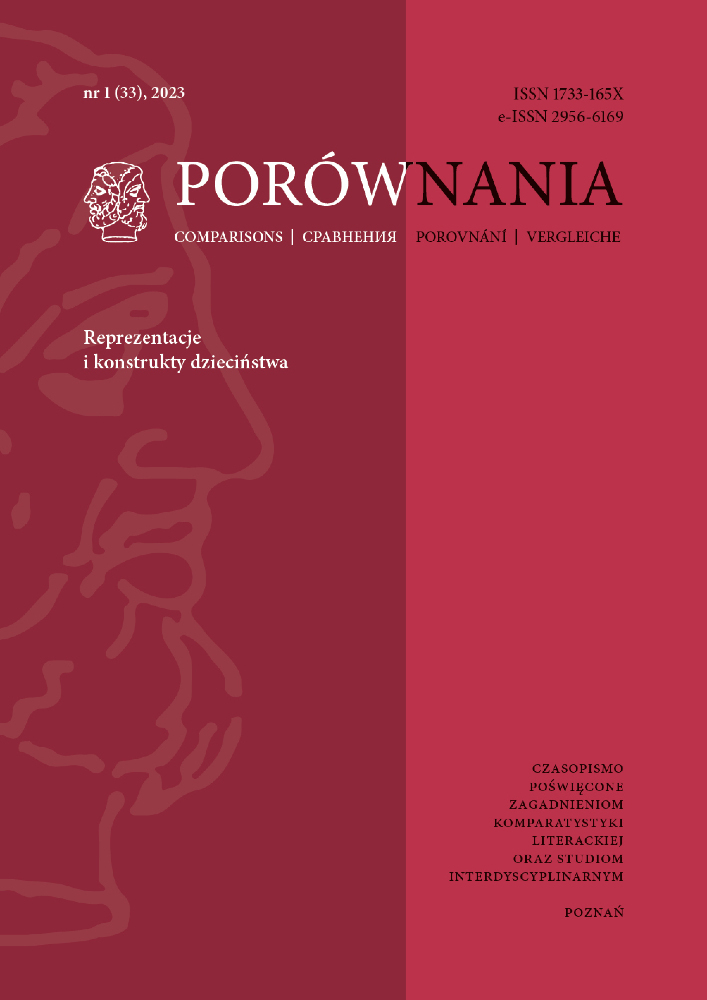Abstract
Anna Cieplak’s novels, from Ma być czysto (2016) to the most recent Rozpływam się (2021), explore the transition from childhood to adolescence, as well as the liminality of these two states. In her novels, Cieplak raises the question of at what point childhood ends. Is there a single, definite moment, an event in the life of a young person that terminates childhood? Or should we perhaps refer to a harmonious, blurred transition between states? The portrait of childhood that emerges from Cieplak’s fiction is confronted with the imagery of childhood contained in other contemporary YA books, either Polish—Agnieszka Wolny-Hamkało and Natalia Osinska—and foreign ones—Petra Dvorakova and Fiona Scarlett.
References
Beauvais Clementine (2015), The Mighty Child: Time and power in children’s literature, John Benjamins Publishing Company, Amsterdam/Philadelphia.
Cieplak Anna, Ostałowska Lidia (2015), Zaufanie, Wydawnictwo Krytyki Politycznej, Warszawa.
Cieplak Anna (2016), Ma być czysto, Wydawnictwo Krytyki Politycznej, Warszawa.
Cieplak Anna (2017), Lata powyżej zera, Znak, Kraków.
Cieplak Anna (2019), Lekki bagaż, Znak, Kraków.
Cieplak Anna (2021a), Rozpływaj się, Wydawnictwo Literackie, Kraków.
Coats Karen (2018), The Bloomsbury Introduction to Children’s and Young Adult Literature, Bloomsbury, London. DOI: https://doi.org/10.5040/9781474205306
Dvorakova Petra (2020), Wrony, przeł. Mirosław Śmigielski, Stara Szkoła, Rudno.
Hunt Peter (2008), Children’s Literature: An Historical Approach, w: Kehily Mary Jane (2008), An Introduction to Childhood Studies, Open University Press, Maidenhead.
Kocznur Agnieszka (2022), Edukacja sensualna: Lato Adeli Agnieszki Wolny-Hamkało, w: „Czas Kultury”, 2 (38).
Masłowska Ewa (2014), Pierwiastek żeński w antropologicznym zespole płodności: woda – ziemia – księżyc – kobieta (w polskiej kulturze ludowej), w: „Kultura i Społeczeństwo”, Wydawnictwo Insytutu Studiów Politycznych PAN, Warszawa.
Mochocka Aleksandra (2017), Two Perspectives on the Performative Social Body: Teenage Make-up Routines in Fanfik and the Jeżycjada cycle, „Miscellanea Posttotalitariana Wratislaviensia”, nr 2(7). DOI: https://doi.org/10.19195/2353-8546.2(7).6
Nikolajeva Maria (2010), Power, Voice and Subjectivity in Literature for Young Readers, Routledge, Abingdon-on-Thames. DOI: https://doi.org/10.4324/9780203866924
Osińska Natalia (2016), Fanfik, Wydawnictwo Krytyki Politycznej, Warszawa.
Pullman Philip (2017), Daemon Voices: On Stories and Storytelling, Vintage Books, New York.
Scarlett Fiona (2021), Boys don’t cry, Faber&Faber, London.
Turner Victor (July 1974), Liminal to Liminoid, in Play, Flow, and Ritual: An Essay in Comparative Symbology. Rice Institute Pamphlet – Rice University Studies. 60 (3).
Waller Alison (2009), Constructing Adolescence in Fantastic Realism, Routledge, New York. DOI: https://doi.org/10.4324/9780203894132
Wells Karen (2017) Making young subjects: liminality and violence, w: Tracy Skelton i in., Identities and Subjectivities, Springer, Singapore, (Geographies of Children and Young People, t. 4), s. 215–230. DOI: https://doi.org/10.1007/978-981-287-023-0_18
Wolny-Hamkało Agnieszka, Błaut Ilona (2016), Nikt nas nie upomni, Hokus-Pokus, Warszawa.
Wolny-Hamkało Agnieszka, Kożuchowska Agnieszka (2019), Lato Adeli, Hokus-Pokus, Warszawa.
License
Copyright (c) 2023 Agnieszka Kocznur

This work is licensed under a Creative Commons Attribution-NoDerivatives 4.0 International License.
Utwory opublikowane w czasopiśmie „Porównania”, na platformie Pressto należącej do Uniwersytetu im. Adama Mickiewicza w Poznaniu są udostępniane na licencji Creative Commons Uznanie autorstwa - Bez utworów zależnych 4.0 Międzynarodowe (CC BY-ND 4.0)
Tym samym wszyscy zainteresowani są uprawnieni do korzystania z utworów opublikowanych pod następującymi warunkami:
-
uznania autorstwa — czyli obowiązek podania wraz z rozpowszechnianym utworem informacji o autorstwie, tytule, źródle (odnośniki do oryginalnego utworu, doi) oraz samej licencji
-
bez utworów zależnych — remiksując, przetwarzając lub tworząc na podstawie utworu, nie wolno rozpowszechniać zmodyfikowanych treści.
-
brak dodatkowych ograniczeń — nie można korzystać ze środków prawnych lub technologicznych, które ograniczają innych w korzystaniu z utworu na warunkach określonych w licencji.
Uniwersytet im. Adama Mickiewicza w Poznaniu zachowuje prawo do czasopisma jako całości (układ, forma graficzna, tytuł, projekt okładki, logo itp.).
Autor zachowuje prawa majątkowe, ale udziela zgody Uniwersytetowi im. Adama Mickiewicza w Poznaniu na wykorzystanie dzieła. Autorzy tekstów zakwalifikowanych do publikacji proszeni są o wypełnienie podpisanie i przesłanie umowa (PL) agreement (EN)
Agreement for granting a royalty-free license to works with a commitment to grant a CC sub-license





